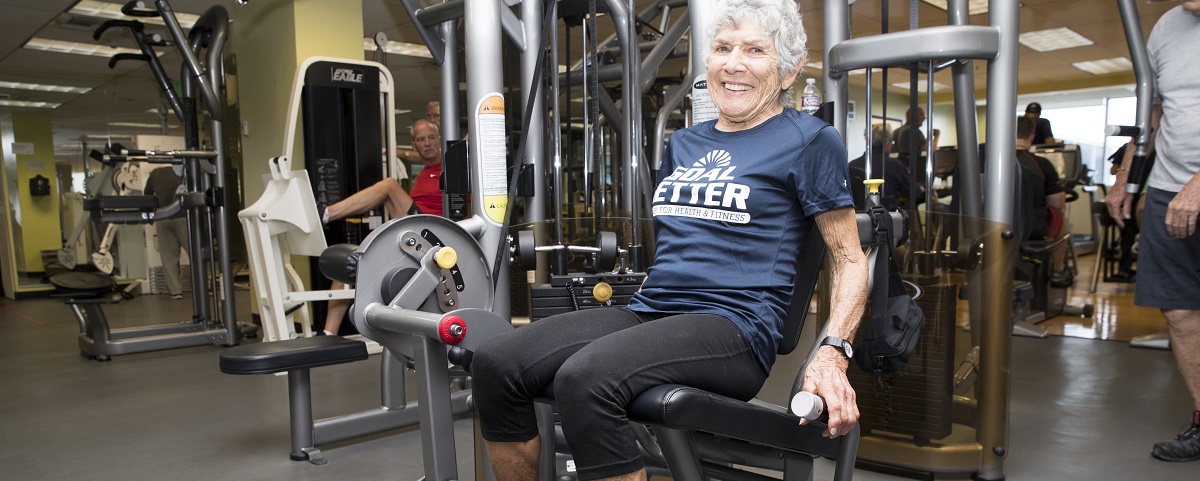CHF member Carmen Sellers, 82, is an archetype for health, happiness and the life-extending benefits of Blue Zones Project’s ‘Power 9 Principles’
By Eric Garner, BCHD Senior Communications Specialist
If it were up to eleven-year-old “Hermosa,” every day would be a dog day afternoon spent basking in the sun and napping on the couch. But instead, three times a day, the aging “senior dog” is roused by a coaxing tug on her leash from owner Carmen Sellers, a sprightly 82-year-old with a perpetual gleam in her eye and pep in her step that belies her age.
“Our walks are more of meanders, strolls or lollygags, to be honest. Hermosa hates exercise, so I motivate her along,” laughs Carmen, a longtime Center for Health & Fitness (CHF) member and avid Blue Zones Project backer whose outspoken health advocacy is inspiring countless locals, aside from her impervious four-legged friend, to embrace a “Blue Zones lifestyle.”
The project’s local poster woman does far more, however, than simply expound healthy advice. She also exemplifies the nine lifestyle behaviors that New York Times bestselling author and National Geographic explorer and researcher Dan Buettner believes can crack the lock on longevity: Blue Zones Project’s “Power 9 Principles.” Carmen happened on Buettner’s community health improvement project four years ago and discovered she’d been, unwittingly, adhering to a “Blue Zones-style” of living for more than 30 years.
“The running joke is that I’m trying to live until I’m 105 and strapped into a wheelchair,” says Carmen with a chuckle. “But I’m after quality of life, not age. And that’s what attracted me to the Blue Zones Project.”
“Blue Zones” are the areas of the world with the highest rate of centenarians – Ikaria, Greece; Loma Linda, California; Nicoya, Cost Rica; Okinawa, Japan; and Sardinia, Italy. Buettner and his research team spent years in these longevity hotspots and observed nine shared behaviors exhibited by centenarians in each Blue Zone. Buettner’s research spawned the creation of Blue Zones Project, a national well-being improvement initiative designed to make healthy choices easier where people live, work, learn and play. Beach Cities Health District (BCHD), one of the largest preventive health agencies in the U.S., successfully launched Blue Zones Project in Hermosa Beach, Manhattan Beach and Redondo Beach in 2010.
The “Power 9”
1. Move Naturally
The world’s longest-lived people inhabit environments that constantly nudge them into moving without thinking about it, according to Buettner’s research.
It’s safe to say exercise also comes second-nature to Carmen, who enjoyed a successful Ultra Cycling career throughout her 50s and 60s, competing in a slew of local, state, regional, national and Senior Olympic events – highlighted by her record-breaking relay performance (65+ age category) in the grueling 3,000-mile Race Across America in 1999.
Today, long retired from racing, the ever-energetic senior bikes 50-75 miles every week; walks her dog for 45-50 minutes (three times daily); lifts weights and takes balance classes at CHF (three days a week); stretches and does calisthenics while watching TV; and seizes every opportunity to bend the ear of anyone in the market for healthy advice.
“When people mope or complain about their health, I tell them to start stretching and moving their bodies each morning, right when they wake up, and then keep moving,” Carmen says with chipper confidence. “Exercise is a natural way to rid aches and pains and create a healthy, happy state of mind. Trust me, it makes a world of difference.”
2. Know your Purpose
The Okinawans call it “ikigi” and the Nicoyans call it “plan de vida” – for both it translates to “why I wake up each morning,” according to Buettner’s research.
For Carmen, it simply translates to helping others.
During the past 25 years, she’s worked one day a week for the City of Redondo Beach, connecting isolated senior citizens to legal, health and social resources in the community. A self-admitted “social butterfly,” Carmen’s a known fixture at most older adult happenings in Redondo Beach, which range from line dances and bingo to yoga and Tai Chi. “It’s incredibly important for seniors to build a social life,” she says. “I love my dog and home, but it’s healthy to venture out and connect with people. I try to lead by example.”
Carmen also serves as an ambassador of sorts for Blue Zones Project, volunteering at a variety of local events, including 10k runs, free fitness initiatives and workshops. Prior to finding the project, she donated 20 years to Beach Cities Health District (BCHD), performing customer service work at its community gym and administering preventive health services to older adults in the community.
“Volunteering is just excellent,” says Carmen with youthful enthusiasm. “Helping those in need and serving your community gives your life purpose and meaning, but more importantly, it also gives purpose and meaning to those around you.”
3. Down Shift
Although everyone experiences stress, the world's longest-lived people have routines to shed that stress, according to Buettner’s research.
Unlike her furry housemate, down-shifting doesn’t come naturally to Carmen, whose thoughts, fittingly, have a tendency to race at breakneck speed.
So every Thursday morning, she squeezes her “mental brakes” through mindful meditation at Veterans Park in Redondo Beach. Under the instruction of mindfulness enthusiast and BCHD Social Worker Shiori Lange, she’s learned to use controlled breathing exercises and visualization techniques to quiet her thoughts and focus on the present moment.
Although admittedly tedious at times, Carmen emphatically points out the stress-relieving benefits are worth the effort. “I have a really chatty Kathy mind … and mouth,” she says. “I’m always on the go, so it’s very healthy for me to take the time to down-shift.”
4. 80% Rule, 5. Plant Slant
While most Blue Zones dwellers only consume small amounts of meat, all of them eat a variety of fresh fruits and vegetables and rarely eat to excess, according to Buettner’s research.
The mere mention of greasy, battered food provokes an audible gag from Carmen. Decades ago, the burgeoning cyclist eagerly swapped deep-fried eats and meat products, save an occasional piece of fish, for raw vegetables and plant-based proteins at the urging of her brother and former racing mentor. It began as a way to build lean muscle and cut fat, but soon developed into a lifestyle.
“I tell people all the time, ‘I don’t make myself eat this way – I like it,’” asserts Carmen. “I feel better and more energetic when I eat plant-based foods, and guilty and unnatural the few times I don’t. And you can forget about deep-fried junk, I won’t touch that.”
6. Wine @ Five
A glass or two of red wine, especially when combined with a plant-based meal, is a good idea for most people, according to Buettner’s research.
Red wine, specifically Cannonau wine from Sardinia, Italy, contains artery-scrubbing flavonoids and the powerful antioxidant polyphenol. Both nutrients are known to lower the risk of contracting certain diseases, including heart disease and some forms of cancer. Moreover, enjoying wine in moderation (1-2 glasses) while breaking bread with friends and family reduces stress, strengthens social connectivity and aids longevity, according to Buettner’s findings.
“I’m a big believer in wine,” says Carmen with a sheepish smirk. “I drink a half-glass each night while preparing dinner and an additional half-glass with my meal. And I just happen to prefer red, so it works out nicely.”
7. Right Tribe
The worlds longest-lived people chose, or were born into, social circles that supported healthy behaviors, according to Buettner’s research.
When Carmen and her friends formed a cycling group years ago, the 12 to 15 members were all in their 50s. Together, they rode miles of sundrenched highways and byways throughout the South Bay, only braking for coffee and an occasional pastry along the way. “We all loved to ride, but I think we valued the social aspects more,” she fondly recalls. “We supported and encouraged each other.”
As the years rolled by, time took an inevitable toll on the tightly knit group – friends relocated, injuries and illnesses sidelined some and others passed away – leaving only Carmen and two original members, a husband and wife in their 80s, to pedal through their Golden Years as a unit. Though their rides “needed to evolve a bit” in recent years – the husband-wife tandem now pilot a bicycle-built-for-two due to health issues – camaraderie and connectedness endure.
“We aren’t riding 60 miles at a time anymore, and we don’t meet as frequently,” says Carmen with a whisper of nostalgia in her voice, “but we still ride two to three times a week. It’s something we all look forward to.”
8. Belong
All but five of the 263 centenarians interviewed in the Blue Zones belonged to some faith-based community, according to Buettner’s research.
Carmen’s a big-believer in the changing power of religion, even though she doesn’t attend church or claim any religious affiliation. Nevertheless, 35 years ago, she gratefully watched her older sister completely transform her life for the better after discovering Evangelical Christianity.
“Oh, she was a mess before,” recalls Carmen. “Religion turned her life around in a big way, which was miraculous to see. But, personally, that’s not for me. I consider myself spiritual.”
Not a day passes where Carmen doesn’t spend time appealing to a higher power or the universe – usually while walking along the Greenbelt in Hermosa Beach, her hometown for more than 40 years. “It’s therapeutic to believe in something greater than you,” she says. “I’m totally wowed by the universe.”
9. Loved Ones First
Happy, healthy centenarians in the Blue Zones put their families first. This can take shape in many ways, including investing time and love with their children and grandchildren, according to Buettner’s research.
Eight-year-old Tommy is a likely cycling and motocross legend in the making. The spunky up-and-comer routinely secures top finishes in punishing off-road races, much to the chagrin of older competition. Losing never enters the pint-sized pedaller’s mind … except when grandma rolls into town.
“I can still beat him on flat ground. Tommy’s not used to second place, so it really irks him,” Carmen crows in delight. “He’s ultra-competitive just like his father … Oh, maybe it runs in the family.”
Carmen, her son, Tom – an accomplished former professional racer in his own right – and grandson unite over a mutual love for extreme sports, but they reinforce their unique family bond through regular phone calls during the week and family outings, laced with intergenerational competition, on weekends.
“Last time we raced, I edged little Tommy out by the nose of my bike tire. My victories are getting narrower and narrower each time, so I’m planning to just quit while I’m ahead,” says Carmen with a telling twinkle in her blue eyes.
Watch Carmen's honoree video for Spirit of Wellness 2017 here.




